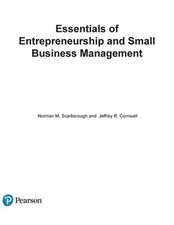Entrepreneurship Policy: Theory and Practice: International Studies in Entrepreneurship, cartea 9
Autor Anders Lundstrom, Lois A. Stevensonen Limba Engleză Paperback – 6 dec 2010
Unlike other research in the field of entrepreneurship where implications from research findings are used to suggest what policy actions should be taken to increase the level of entrepreneurship in an economy, this study is based on what entrepreneurship policy actions are being taken. This is a unique book in the field which points to the way forward both for policymakers and for the research community in terms of thinking about entrepreneurship policy and the complex issues surrounding its development.
| Toate formatele și edițiile | Preț | Express |
|---|---|---|
| Paperback (1) | 1218.21 lei 6-8 săpt. | |
| Springer Us – 6 dec 2010 | 1218.21 lei 6-8 săpt. | |
| Hardback (1) | 1224.36 lei 6-8 săpt. | |
| Springer Us – 30 mar 2005 | 1224.36 lei 6-8 săpt. |
Din seria International Studies in Entrepreneurship
-
 Preț: 362.54 lei
Preț: 362.54 lei - 17%
 Preț: 428.32 lei
Preț: 428.32 lei - 15%
 Preț: 642.68 lei
Preț: 642.68 lei - 15%
 Preț: 640.55 lei
Preț: 640.55 lei - 15%
 Preț: 637.78 lei
Preț: 637.78 lei - 18%
 Preț: 951.29 lei
Preț: 951.29 lei - 15%
 Preț: 644.30 lei
Preț: 644.30 lei - 18%
 Preț: 947.85 lei
Preț: 947.85 lei - 15%
 Preț: 643.99 lei
Preț: 643.99 lei - 15%
 Preț: 642.51 lei
Preț: 642.51 lei - 18%
 Preț: 953.65 lei
Preț: 953.65 lei - 18%
 Preț: 949.73 lei
Preț: 949.73 lei - 15%
 Preț: 637.59 lei
Preț: 637.59 lei - 15%
 Preț: 642.51 lei
Preț: 642.51 lei - 15%
 Preț: 642.68 lei
Preț: 642.68 lei - 18%
 Preț: 952.72 lei
Preț: 952.72 lei - 18%
 Preț: 951.47 lei
Preț: 951.47 lei - 18%
 Preț: 944.82 lei
Preț: 944.82 lei - 18%
 Preț: 947.67 lei
Preț: 947.67 lei - 18%
 Preț: 949.42 lei
Preț: 949.42 lei - 15%
 Preț: 632.05 lei
Preț: 632.05 lei - 15%
 Preț: 638.57 lei
Preț: 638.57 lei - 18%
 Preț: 948.16 lei
Preț: 948.16 lei - 18%
 Preț: 954.45 lei
Preț: 954.45 lei - 18%
 Preț: 1221.02 lei
Preț: 1221.02 lei - 18%
 Preț: 951.47 lei
Preț: 951.47 lei
Preț: 1218.21 lei
Preț vechi: 1485.62 lei
-18% Nou
Puncte Express: 1827
Preț estimativ în valută:
233.14€ • 242.50$ • 192.47£
233.14€ • 242.50$ • 192.47£
Carte tipărită la comandă
Livrare economică 15-29 aprilie
Preluare comenzi: 021 569.72.76
Specificații
ISBN-13: 9781441936936
ISBN-10: 1441936939
Pagini: 310
Ilustrații: XIV, 310 p.
Dimensiuni: 155 x 235 x 17 mm
Greutate: 0.46 kg
Ediția:Softcover reprint of hardcover 1st ed. 2005
Editura: Springer Us
Colecția Springer
Seria International Studies in Entrepreneurship
Locul publicării:New York, NY, United States
ISBN-10: 1441936939
Pagini: 310
Ilustrații: XIV, 310 p.
Dimensiuni: 155 x 235 x 17 mm
Greutate: 0.46 kg
Ediția:Softcover reprint of hardcover 1st ed. 2005
Editura: Springer Us
Colecția Springer
Seria International Studies in Entrepreneurship
Locul publicării:New York, NY, United States
Public țintă
ResearchCuprins
Entrepreneurship Policy — Definitions, Foundations and Framework.- Entrepreneurship Policy Typologies.- Context — The Base of Entrepreneurship Policy.- A Conceptual Model for Entrepreneurship.- Evaluation Problems and Perspectives.- Completing the E-Policy Journey.
Recenzii
"If you are interested in encouraging entrepreneurship in your country, this is the book you should read. Based on actual experience in 13 countries, it provides guidance on how to think about, structure, implement, and evaluate a policy that will get you there."
Dr. David Birch, Economist and entrepreneur, Boston, USA
"Lundström and Stevenson have written a "tour de force". They have taken a set of disparate initiatives which seem to have evolved in an ad-hoc manner and weaved them together in a coherent manner. No longer can governments justify consideration of Entrepreneurship policy on the grounds that it lacks intellectual rigour and evidence of effectiveness."
Dr. David Storey, Director, Centre for Small Business, University of Warwick, UK
"Evidence supporting the association between national economic growth and a vigorous entrepreneurial sector continues to accumulate. As might be expected, government administrators and policy experts around the world are responding by attempting to enhance their countries as a context for business creation. The sustained research program on entrepreneurship policy initiated by Lundström and Stevenson is unprecedented and unique. This monograph, a current status report, is the best available source on the scope and impact of government efforts to promote entrepreneurship. It would be irresponsible to create new entrepreneurship policy without consulting this work."
Dr. Paul Reynolds, Professor, Florida International University, USA
Dr. David Birch, Economist and entrepreneur, Boston, USA
"Lundström and Stevenson have written a "tour de force". They have taken a set of disparate initiatives which seem to have evolved in an ad-hoc manner and weaved them together in a coherent manner. No longer can governments justify consideration of Entrepreneurship policy on the grounds that it lacks intellectual rigour and evidence of effectiveness."
Dr. David Storey, Director, Centre for Small Business, University of Warwick, UK
"Evidence supporting the association between national economic growth and a vigorous entrepreneurial sector continues to accumulate. As might be expected, government administrators and policy experts around the world are responding by attempting to enhance their countries as a context for business creation. The sustained research program on entrepreneurship policy initiated by Lundström and Stevenson is unprecedented and unique. This monograph, a current status report, is the best available source on the scope and impact of government efforts to promote entrepreneurship. It would be irresponsible to create new entrepreneurship policy without consulting this work."
Dr. Paul Reynolds, Professor, Florida International University, USA
Notă biografică
Lois Stevenson is a leading authority on entrepreneurship development and its role in government policy. She is a former Director of SME Policy with Industry Canada and former Director, Entrepreneurship Development with the Atlantic Canada Opportunities Agency, one of Canada’s regional development agencies. She is currently an executive in the Policy Sector of Industry Canada and works on issues related to innovation policy. In 2002-03, she played a lead role in the Government of Canada’s Innovation Strategy public engagement process and continues to develop learning venues to transfer know-how in the management of innovation to academic and business audiences, featuring case profiles of innovating Canadian firms and live studio interviews with their CEOs. Prior to beginning work with the Government of Canada in 1990, she spent ten years as a university professor teaching and researching in the areas of entrepreneurship and small business management. She is author of seven books and over 40 articles and papers published in refereed journals and conference proceedings. Her topics have dealt with women entrepreneurs, young entrepreneurs, the role of entrepreneurship in development, and entrepreneurship policy. She has been invited to deliver keynote addresses and workshops in many countries around the world, including Australia, Taiwan, Croatia, Brazil, South Africa, Sweden, Zimbabwe, Norway and the Netherlands. Ms. Stevenson is a member of the International Reference Council of the Swedish Foundation for Small Business Research (FSF) and during 2000-01 was a visiting researcher with the Foundation leading an international study of entrepreneurship policy. She has worked in major corporations such as IBM and the Royal Bank and been involved in two of her own businesses. She is Past-President of the International Council for Small Business (ICSB) (97-98), Past-President of the Canadian Council for Small Business and Entrepreneurship (CCSBE), a member of theErnst&Young Entrepreneurship Of The Year Institute, a Fellow of the Price-Babson College Fellows Program, a Fellow of the IC2 Institute of the University of Texas at Austin and a Wilford White Fellow.
Anders Lundström is Founder and President of The Swedish Foundation for Small Business Research (FSF), with offices in Orebro and Stockholm, Sweden and Brussels. He is responsible for the FSF research program concerning the Effects of Small Business and Entrepreneurship Policy Programs and has conducted many studies concerning problems and possibilities for SMEs and also a number of studies concerning policy issues. He is also chairing the International Council and Scientific Forum of FSF. The International Council consists of all winners of the FSF-NUTEK Award and expert and researchers from US, Canada, Germany, the Netherlands, UK, Denmark and the EU-Commission and the Scientific Forum consists of nearly all associate and full professors in the area of entrepreneurship and small business research in Sweden. Dr. Lundström was Deputy-Director at NUTEK, Sweden’s Business Development Agency, and prior to that, the Research Director at SIND, the Swedish National Industrial Board. He founded and chaired FSF in 1994 and became its President in 1997. He also founded theFSF-NUTEK Award, the International Award for Small Business and Entrepreneurship Research in 1996. Dr. Lundström has written over 20 books and a lot of articles in the field of small business and entrepreneurship. He is a Professor at the Business School of Mälardalens University and Associated Professor at the Gothenburg Business School, where he obtained his PhD in Business.
Anders Lundström is Founder and President of The Swedish Foundation for Small Business Research (FSF), with offices in Orebro and Stockholm, Sweden and Brussels. He is responsible for the FSF research program concerning the Effects of Small Business and Entrepreneurship Policy Programs and has conducted many studies concerning problems and possibilities for SMEs and also a number of studies concerning policy issues. He is also chairing the International Council and Scientific Forum of FSF. The International Council consists of all winners of the FSF-NUTEK Award and expert and researchers from US, Canada, Germany, the Netherlands, UK, Denmark and the EU-Commission and the Scientific Forum consists of nearly all associate and full professors in the area of entrepreneurship and small business research in Sweden. Dr. Lundström was Deputy-Director at NUTEK, Sweden’s Business Development Agency, and prior to that, the Research Director at SIND, the Swedish National Industrial Board. He founded and chaired FSF in 1994 and became its President in 1997. He also founded theFSF-NUTEK Award, the International Award for Small Business and Entrepreneurship Research in 1996. Dr. Lundström has written over 20 books and a lot of articles in the field of small business and entrepreneurship. He is a Professor at the Business School of Mälardalens University and Associated Professor at the Gothenburg Business School, where he obtained his PhD in Business.
Textul de pe ultima copertă
Entrepreneurship Policy: Theory and Practice is the first book to fully analyze the construction of entrepreneurship policy, a rapidly-evolving area of policy about which little is known. From a study and assessment of the practices of governments in thirteen countries in Europe, North America and the Asia-Pacific region, this book fully describes the policy area and shares new tools and methods for better understanding and explaining the how and why of an entrepreneurship policy approach.
The work features a number of new methods which can be used to analyze and assess policy gaps and opportunities for future actions in the area and for understanding the most appropriate mix of policy options. Methods of note include the entrepreneurship policy comprehensiveness index and the context method. It presents a conceptual model describing the many factors which affect, in a dynamic way, the level of entrepreneurship in a country or region. It also describes a typology of entrepreneurship policy which will be useful to others in categorizing their policy approaches.
Unlike other research in the field of entrepreneurship where implications from research findings are used to suggest what policy actions should be taken to increase the level of entrepreneurship in an economy, this study is based on what entrepreneurship policy actions are being taken. This is a unique book in the field in that it points the way forward both for policymakers and for the research community in terms of thinking about entrepreneurship policy and the complex issues surrounding its development.
The work features a number of new methods which can be used to analyze and assess policy gaps and opportunities for future actions in the area and for understanding the most appropriate mix of policy options. Methods of note include the entrepreneurship policy comprehensiveness index and the context method. It presents a conceptual model describing the many factors which affect, in a dynamic way, the level of entrepreneurship in a country or region. It also describes a typology of entrepreneurship policy which will be useful to others in categorizing their policy approaches.
Unlike other research in the field of entrepreneurship where implications from research findings are used to suggest what policy actions should be taken to increase the level of entrepreneurship in an economy, this study is based on what entrepreneurship policy actions are being taken. This is a unique book in the field in that it points the way forward both for policymakers and for the research community in terms of thinking about entrepreneurship policy and the complex issues surrounding its development.
Caracteristici
One of the first to address entrepreneurship policy, its development in nations around the world, how it can be understood and assessed and the implications of this for the policy-making and research society

















